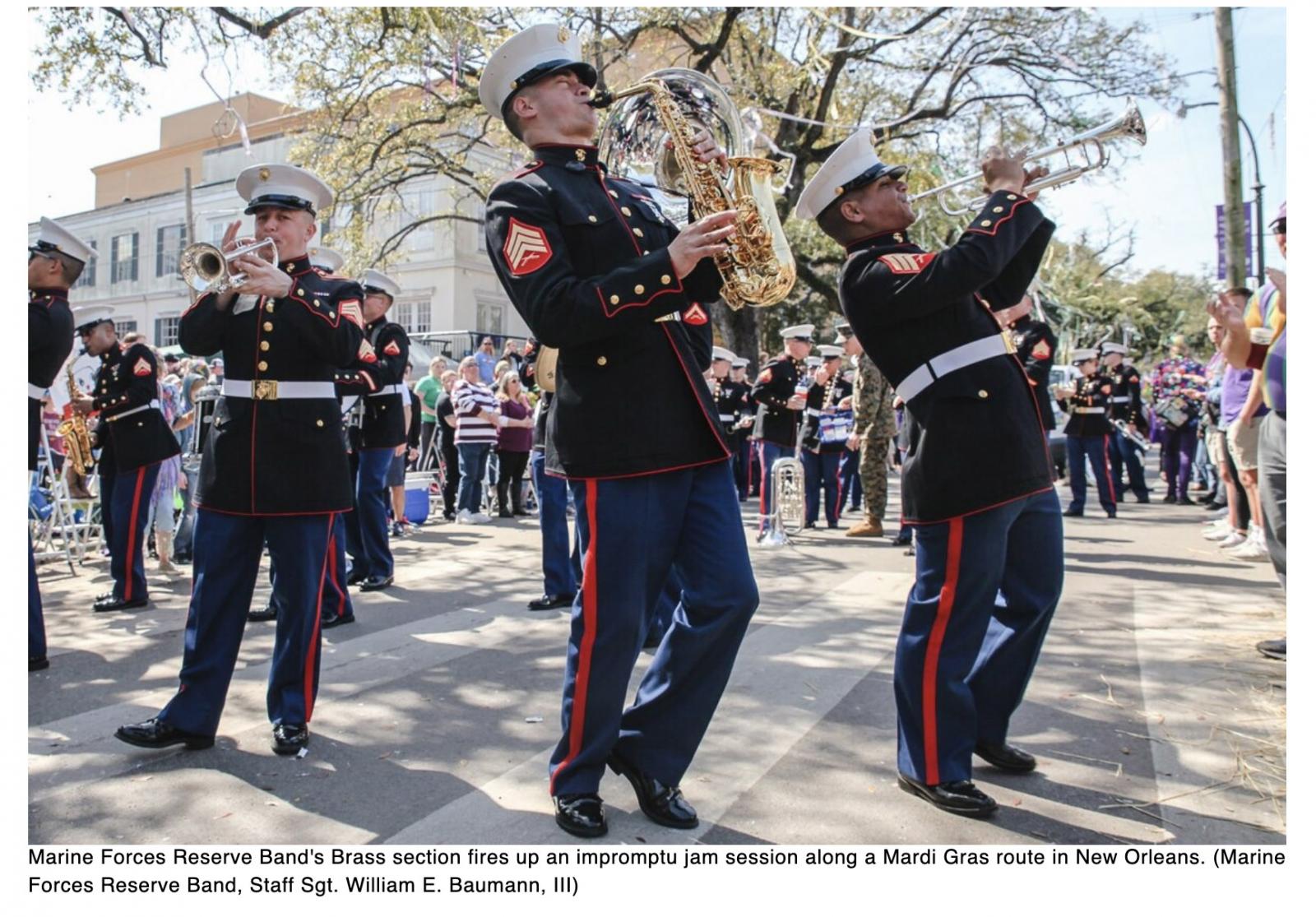

The Marine Corps Reserve brass band at New Orleans Mardi Gras at the Krewe of Nyx parade Feb. 19. (Kristine Froeba/Staff)

Parris Island, South Carolina, Marine Band Drum Major Staff Sgt. Eric N. Gonzales leads the Mardi Gras Krewe of Thoth parade down Magazine Street, New Orleans, February 23. (Kristine Froeba/Staff)

Marine Forces Reserve Band's Brass section leads a jam session along a Mardi Gras nighttime parade route New Orleans in February. (Marine Forces Reserve Band, Staff Sgt. William E. Baumann, III)

Parris Island, South Carolina, Marine band drummer strikes the bass drum along the Mardi Gras route of the Krewe of Hermes parade, New Orleans, Friday. (Kristine Froeba/Staff)

A Marine Forces Reserve Band member poses with actor Bryan Cranston, the king of the Krewe of Orpheus, before the parade in New Orleans, Feb. 24. (Staff Sgt. William E. Baumann, III)
“There is no sharper band in all of Carnival than the Marine Corps Band,” New Orleans author and Mardi Gras historian Errol Laborde has written.
For the lucky blocks of revelers at the start of these parades, it’s not unusual to see the Marine Reserve Forces brass band combo break formation and fire up impromptu street concerts and jam sessions for waiting crowds.
“My children love to see the Marine Band in the parades," Maj. Roger Hollenbeck, communications, strategy and operations officer at New Orleans Marine Forces Reserve told Marine Corps Times. "Their eyes light up.”
The hundred-years-old and miles long parades routinely begin with a salute to the king and court of each parade. A rendition of the national anthem is played by the Marine band as part of the salute before the band is lead by the Marine Forces Reserve Honor Guard through the streets of the city.
“Mardi Gras season is a great opportunity for our Marines to embrace the unique culture and traditions that this city has to offer,” said 1st Lt. Kristine Racicot, communication strategy and operations, Marine Forces Reserve. “The Marine Forces Reserve Band and members of our color guard details participate in numerous balls and parades throughout the city.”
The official march, accomplished with perfect posture and eyes front is done over beads that can turn patent leather oxfords into roller skates. Dodging and dancing over New Orleans famous pot holes like the other Mardi Gras marching bands is not an option.
“They are pretty good at putting us in the front of the parade to avoid the majority of the beads,” said Warrant Officer Eric Kyne, band director of Marine Forces Reserve Band.
Due to the number of concurrent parades and formal balls held in honor of each krewe, or parade-leading social organization, over the long season, additional Marine bands are flown in to fill in the hectic calendar.
“We still play most of the balls such as Endymion, Zulu, and Rex," said Kyne. “We’re the night owls.”
The 2nd Marine Division Band of Camp Lejeune, North Carolina, and the Parris Island, South Carolina, Marine Band led the parades of Krewe d’Etat, Krewe of Hermes, Krewe of Iris, Krewe of Thoth, Krewe of Bacchus, and lead the Mardi Gras day Zulu and Rex parades.
The Marine Forces Reserve Band was founded in 1978 and has become an interval component to New Orleans festivities in the 42 years since its creation.
Over a hundred years of history intertwine the United States Marine Corps and Mardi Gras.
In addition to Mardi Gras festivities, the Marine Forces Reserve Band performs over 350 concerts, parades, and ceremonies before more than 8 million people annually.
The band includes several ensembles: the concert band, which utilizes almost every musician in the unit and is the largest ensemble of the group. The ceremonial band is seen at sporting events and half-time performances, the jazz combo, a woodwind quintet, and the favorite, the Big Band modeled after the Glenn Miller Band and Count Basie Orchestras. The latest formation is the Marine Corps Reserve rock band.
Marine Forces Reserve Band New Orleans is one of ten Marine Corps fleet bands. The unit is comprised of active-duty Marines stationed at the Marine Corps Support Facility in New Orleans, Louisiana.
All 56 members of the band are trained riflemen and fulfill Corps-wide physical fitness and combat training requirements, just like any other active-duty Marines, according to the band’s website. The band members also can be called upon to provide security, both domestically and overseas, by order of Marine Forces Reserve.
After Mardi Gras, the Marine Forces Reserve Band is headed to Texas to support the Houston Livestock Show and Rodeo for a concert and parade.